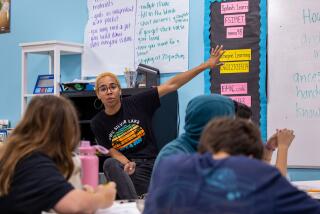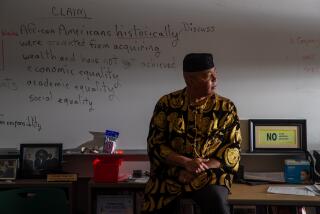MISSION VIEJO : Talk Puts Ghana on Students’ Maps
- Share via
For at least an hour, students in Gary Keene’s seventh-grade world history and geography class experienced what it might be like to attend school in the West African country of Ghana.
“How is your house?” guest speaker Herman Davis asked the Newhart Middle School class last week, speaking in Ashanti, the major language of Ghana.
” Odo ,” they replied, meaning “fine,” rising to their feet in an act of respect demanded by Ghanaian teachers from their students.
And until Davis gave them permission to sit, the students remained standing at attention.
“Teachers are like gods over there. They have all the power in the world,” Davis explained to the class.
The presentation by Davis, who spent four years in Ghana in the mid-1970s on a Peace Corps assignment to teach Ghanaian instructors the principles of new math, came as Keene’s students studied the culture and history of Africa.
Davis, a Rancho Santa Margarita resident and Long Beach high school math teacher, has maintained close ties with Ghana since returning to his native California in 1976. While in Ghana, he met and married his wife, Naa Lamioker, a Ghanaian nurse who worked in the same village as Davis. Their 12-year-old daughter, Ursula, attends Keene’s class and suggested that her father come in and share their culture.
“It’s really interesting,” said Ursula Davis, who has visited Ghana six times. “No one else in this school knew about Ghana.”
During the presentation, Herman Davis spent most of his time talking about the differences between Ghanaian and American schools.
“There are no fights there. The most serious problem they had at my school was girls and boys holding hands,” Davis told the class, prompting laughs of disbelief from the students.
But perhaps more surprising to them was that students in Ghana don’t attend high school unless they pass a test and that Ghanaian teachers have the power to whip a student in rare instances of disobedience.
“In education over there, only the strong survive,” Davis said. “It’s competitive. Some Americans are really lucky. Most of the people in the world have to compete for their education. We get it for free.”
Until recently, there was little mention of West Africa in seventh-grade textbooks, but that has all changed, opening a new world to the students, Keene said.
“Africa is obviously in the news, on our minds,” he said. “I have a couple of students whose parents are overseas in Somalia. What we study in the classroom relates time and time again to the lives of people outside of the classroom.”
More to Read
Sign up for Essential California
The most important California stories and recommendations in your inbox every morning.
You may occasionally receive promotional content from the Los Angeles Times.













